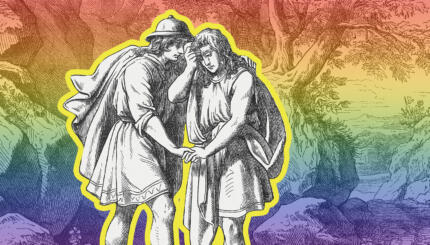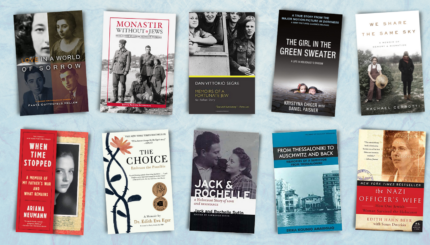Excerpted and reprinted, with permission of the author, from Moment Magazine, April 2001.
It is impossible to get an accurate number of gay Orthodox Jews. There is no official membership, and only a handful of people are willing to put their names on support-group lists.
Shlomo Ashkinazy, a gay-rights activist and Orthodox Jew who lives in New York City, says he has spoken with over 200 gay Orthodox Jews over the past few years. Filmmaker Sandi DuBowski, who produced and directed Trembling Before G-d, interviewed hundreds of gay (observant) Jews over the past few years for his movie. And those involved in gay community outreach say there are many more out there.
Open and Secret Support Groups
In the New York area, home to the largest concentration of gay Orthodox Jews, at least four support groups have sprung up to meet their needs. There are also a number of informal groups that meet on a monthly basis for meals or study. Some of these informal groups, many of which operate in secret, have been around for years.

Help us keep Jewish knowledge accessible to millions of people around the world.
Your donation to My Jewish Learning fuels endless journeys of Jewish discovery. With your help, My Jewish Learning can continue to provide nonstop opportunities for learning, connection and growth.
"It’s almost a cliche," says Ashkinazy, who helped found one of the support groups. "Every gay frum Jew who finds out about [the support networks] says, ‘I thought I was the only one.’"
The three founders of the Gay and Lesbian Yeshiva Day School Alumni Association chose that name specifically to attract a gay group with an Orthodox background. The group was publicized solely through word-of-mouth.
Sixty people showed up at the first meeting. For Chaim, then 28, walking into a room and meeting people like himself for the first time was a powerful experience. "I had told one person I was [gay]," he says. "All these people were going through the same thing. To see that you’re not alone gives you inner strength."
"I am a different person today than I was five years ago," he adds. "I [now] know who I am."
GLYDSA has a confidentiality agreement that extends to all its members. Between 30 to 60 people show up at the group’s monthly meetings in New York City, organizers say. Chaim estimates that about 2,000 people have come to meetings over the past five years.
"The people who come are a total cross-section from the Jewish community," he says. "People with black hats, colored yarmulkes, girls who wear skirts, pants. Hasidishe [Hasidic] people. And they come from all over. We’ve had people from Boston, Washington, Florida, California, Israel, England, France, Canada. They come to see that there is something out there for them."
Similar groups exist in Israel, England, and California. The first West Coast support group was founded in Los Angeles by "Jacob," a 54-year-old Orthodox gay Jew who had been married and living in a New York suburb until ten years ago, when he confessed to his wife that he was gay. Jacob hasn’t seen his children since. He tried attending Reform synagogues, but because of his level of observance, he was not comfortable. He started attending an Orthodox synagogue, but was treated as a second-class member (he did not receive aliyot [he was not called up to the ], for example) because he was gay.
The Internet Creates a Community
GLYDSA does very little advertising, but its presence on the Internet has helped people to find out about it. The anonymity provided by the Internet has been a godsend to Orthodox gays. Suddenly, questions can be asked without fear of exposure.
Another Web site, Orthogays, provides resources and answers to the most frequently asked questions. Is it possible to be Orthodox and gay or lesbian? What does the Torah say about homosexuality? What can I do about sex as an Orthodox gay Jew? Can I still be Orthodox if I have gay sex? Why did God make me gay? What about the of peru urevu (procreation)? How can I contribute to the continuity of the Jewish people?
Chat rooms enable people to safely meet and talk about topics that would normally be viewed as taboo. The topics in those chat rooms vary widely. They have recently included: What constitutes sex for an Orthodox gay couple? Should Orthodox gays come out? What should be said when gay bashing is heard at a Shabbat meal?
"Miryam’s" interest in starting OrthoDykes, a group for Orthodox Jewish lesbians, had its start in Israel about ten years ago. The issues for Orthodox lesbians are different than for Orthodox gay men, in part because the Torah does not specifically prohibit lesbian sex.
Still, these women are often married and have children, and coming out would mean isolation. "[Orthodoxy] is all they know," says Miryam. "They love the rituals, the Sabbath, the davening [praying]. But then religion becomes the thing that means they have to reject a part of themselves. Your spiritual side is as powerful as your sexual side. You can’t ignore [one] at the expense of the other."
Ashkinazy, meanwhile, says the groups are transforming the community. For a long time, he says, "people couldn’t conceive that it was possible to be gay and frum, so they were leaving [Orthodoxy] in droves." Now, he says, "More and more people are staying frum–because of the support system and the role models."
The Lives They Live
Many gay Orthodox Jews attempt to ignore their sexual impulses, perhaps even marrying and raising families. Others act on their impulses to a point–avoiding intercourse because of the biblical prohibition. And then there are those who lead fully gay lives, ignoring the halakhic [Jewish legal] ban on gay sex.
"Ovadia" is in the first group. Ovadia lives in a right-wing Orthodox community in New York. He confessed to his wife that he was gay when she was pregnant with their fourth child. She stayed with him, and they now have six children. Ovadia attends Ashkinazy’s support group for gay Orthodox men, and says he enjoys the camaraderie. But he would never tell anyone at his that he goes to these meetings. He says he and his family have too much to lose.
Richard Isay, a gay New York-based psychoanalyst, estimates that 15 to 20 percent of gay men marry women–because they want to deny or "cure" their gayness, or want children, or to please their parents. After a few years, Isay says, many have episodes of unfaithfulness. After 20 years of marriage, most of these couples were divorced or stuck in loveless marriages. He adds that in the Orthodox community, the number of gay men marrying in pursuit of traditional lives is much higher than in the secular world.
"In the Orthodox world the pressure to conform is enormous," says Naomi Mark, a psychotherapist in private practice in Manhattan with a large Orthodox clientele. "Throughout life you are learning about the values of family, Torah, and how the mitzvah of peru urevu is incumbent upon men. The barriers to accepting one’s impulses are that much harder because the cost is so great."


